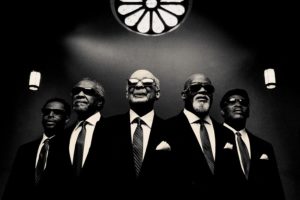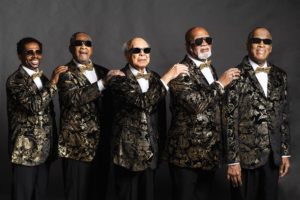Eric McKinnie, who is known as Ricky, has been a member of the Blind Boys of Alabama since 1989. But the renowned gospel group launched 50 years before that. Clarence Fountain and his friends at the Alabama Institute for the Negro Blind formed the group in 1939. For more than eight decades, the Blind Boys have persevered and thrived in the music industry.

They will perform at the Payomet Performing Arts Center in North Truro on Saturday, Aug. 20.
McKinnie, who was born in 1952, says he’s known about the Blind Boys since he was four years old. He lost his sight due to glaucoma at age 23.
“But Clarence knew my mother first,” he says. His mother, Sarah McKinnie Shivers, was a singer who often crossed paths with the Blind Boys.
McKinnie, who sings and plays the drums, hopped from band to band in his teens and early 20s, joining Troy Ramey and the Soul Searchers in 1970 and then the Gospel Keynotes in 1972. In the late ’70s, he started his own band: the Ricky McKinnie Singers.
The Blind Boys, whose members are almost all visually impaired, invited McKinnie to be their drummer.
“I’ve always had respect for them,” McKinnie says. “I was happy to join.” In 2013, after the death of vocalist Billy Bower, McKinnie became one of the group’s singers. The current members are McKinnie, Jimmy Carter, the Rev. Julius Love, Sterling Glass, and Joey Williams.
“We’re like brothers,” McKinnie says.
The Blind Boys have won five Grammys and, in 2009, received a Grammy Lifetime Achievement Award. They’ve performed at the White House for three different presidents and with artists spanning many musical genres from Prince to Bon Iver. They have been featured in theatrical productions and T.V. show soundtracks.
Despite their range of musical collaborations, McKinnie says that the group remains focused on singing traditional gospel.
“Our genre is traditional,” he says. “We just sing mainstream. We’re not going to change who we are or what we do.”

But McKinnie strongly believes in working with different artists.
“We believe that working together works, and people need people,” he says. “So, if you’ve got a good song, and good lyrics, we don’t mind singing it.”
The Blind Boys have been popular for more than 80 years, but their audience has changed over time.
“When we were starting out, our audience was primarily Black,” McKinnie says. “But now we sing to all people, all ethnic groups, people from all over the world.”
Part of the reason for their wider audience is the message of gospel music, McKinnie continues. “Traditional gospel is supposed to make people feel good,” he says. “Our goal is to inspire people. The Blind Boys have lasted this long because we believe in what we do.”
At Payomet, the group will sing classics like “Amazing Grace,” “Spirit in the Sky,” and “People Get Ready.”
“Songs that make people want to get up and dance,” McKinnie says.
The Blind Boys also have a message about disability.
“We convey to the audience that being blind is not a handicap,” McKinnie says. “It’s a disability, but everybody has a limitation. Whatever your situation is, you can be what you want to be, if you believe in yourself and you believe in God.”
In terms of his own life, McKinnie has a motto: “I’m not blind — I just can’t see.”
He says he has always had a vision. He has directed his own group and sung with other groups.
He owns a studio in Atlanta called Quality Sound Management, and he runs a nonprofit called Traditions Cultural Arts Inc., which is dedicated to preserving traditional arts and supporting veterans of the industry.
“My thing is this,” McKinnie says. “I’ve always been a dreamer. If you can dream and dream, do the work, and keep the faith, everything is gonna be all right.”
He says the Blind Boys of Alabama are excited to return to Cape Cod where they’ve performed many times.
“End the article with me saying this,” McKinnie says. “Don’t miss it when the boys are back in town.”
Amazing Grace
The event: The Blind Boys of Alabama in concert
The time: Saturday, Aug. 20, 7 p.m.
The place: Payomet Performing Arts Center, 29 Old Dewline Road, North Truro
The cost: $28 to $45 at tickets.payomet.org
